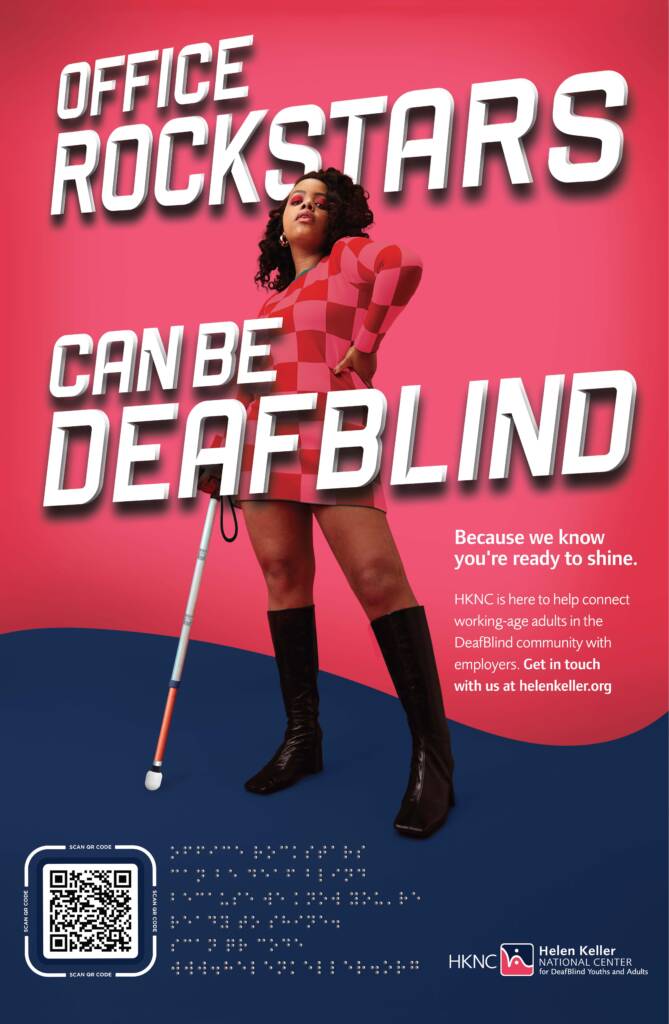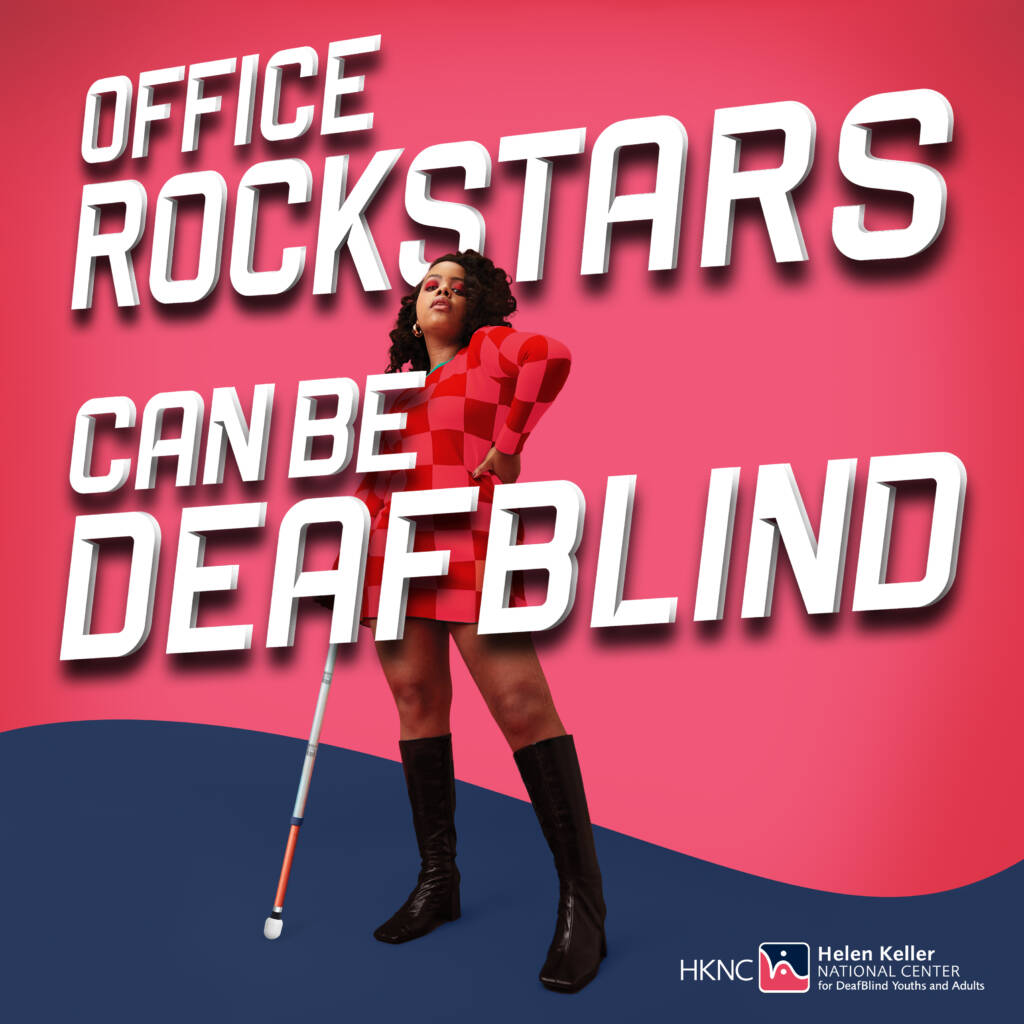What is DeafBlind Awareness Week?
DeafBlind Awareness Week is an annual event that takes place during the last week of June. In 2023, we will celebrate DeafBlind Awareness Week from June 25th to July 1st. This coincides with the birthday of Helen Keller on June 27, 1880. This national advocacy campaign has been held each year since 1984 when the then-President Ronald Reagan issued a proclamation in recognition of this special week. The purpose of DeafBlind Awareness Week is to raise public awareness about individuals who have combined hearing and vision loss. Today, there are 2.4 million people who are DeafBlind in the United States.
The awareness week aims to promote a better understanding of the challenges faced by DeafBlind individuals and to celebrate their unique abilities and contributions to society. During this week, various organizations and advocates host events and activities to increase public awareness and promote inclusivity and accessibility for DeafBlind individuals.
This year’s campaign celebrates the strengths and contributions of members of the DeafBlind community at work. Helen Keller National Center provides employment services and can connect job seekers to employers. OFFICE ROCKSTARS CAN BE DEAFBLIND!

Audio Image Description
Image Description
A black woman stands in a confident pose with her hand on her hip and holds a white cane while in front of a red and blue background. Big white words say “Office Rockstars Can Be DeafBlind” on top of her. Beneath those words to the right are smaller words that say “Because we know you’re ready to shine. HKNC is here to help connect working-aged adults in the DeafBlind community with employers. Get in touch today.” At the bottom of the poster is a QR code with tactile marking around it. Beside it shows lines of braille that transcribes all words on the poster, and then the Helen Keller National Center for DeafBlind Youths and Adults logo is in the right hand corner. [End of Description]
DeafBlind Awareness Week: A Message From Nathalie
Narrator: Nathalie, a DeafBlind female with long dark hair, sits at a table facing the camera.
Nathalie: I am a rehabilitation specialist at Helen Keller and I work in the residence with the students.
I am diagnosed with Usher syndrome Type 2. And I was born with low vision and then at the age of 3, I was diagnosed with hearing loss.
One of the challenges I have faced with Usher syndrome is independence. Traveling independently. Coming here to Helen Keller, I improved my mobility skills, and gained more confidence in how to be more independent in the community.
Another one of the challenges is being accepted for what I am as a DeafBlind person. Many people don’t know how to approach a DeafBlind individual. And over the years, I have learned that sometimes it’s best to educate people who are hearing / sighted about DeafBlind culture and understanding about who we are as a person, and that we’re no different.
When you approach somebody who is DeafBlind in the workforce, never assume what their potentials are. Because you don’t know what their abilities are, and what they can do.
Sometimes I do feel like I’m a rockstar in the residence. Because not only am I working with consumers who are DeafBlind, but I’m also a role model for them, that just because we have a dual impairment doesn’t mean that we can’t work.
We’re just like everyone else. We’re trying to find value and purpose in our lives. And going to work is one of the things that we value.
I have people who approach me like, “you’re working here?” “You’re actually working… you’re taking a cab, you go to the store and you don’t rely on your family?” And I’m like, “yeah, I do all that.” And I love it because I know I’m able to do it, I’m able to be in the community and I’m not afraid. And that’s something I have learned when I was here at Helen Keller.
My name is Nathalie. Just remember, office rockstars can be DeafBlind!
All right!
Narrator: Video fades to the Helen Keller Services logo and QR code, over a white background, with the statement, Join HKS’ mission to support future DeafBlind office rockstars like Nathalie. [End of Transcript]
Join Us in Celebrating DeafBlind Awareness Week
1. Learn about the DeafBlind community
Being DeafBlind refers to an individual who has combined hearing and vison loss. At Helen Keller National Center (HKNC), we believe that education is essential to understanding the challenges and celebrating the accomplishments of DeafBlind individuals.
HKNC is the only national agency that provides information, referrals, support, and a Comprehensive Vocational and Rehabilitation Program to DeafBlind youths and adults who have a combined hearing and vision loss. HKNC also provides support to the families and professionals who work with them.
In honor of DeafBlind Awareness Week (DBAW), HKNC offered FREE access to three eligible course until 8/1/23. The course were called 1) Ensuring Access to Communication, 2) Inclusive Communication, and 3) Tech Solutions for Older Adults. These courses are available for purchase in our Learning Center.
2. Raise awareness online

During DeafBlind Awareness Week, we encourage you to raise awareness for inclusivity in the workplace by sharing our campaign graphic on social media. Use the hashtag #DBAW, and tag @helenkellerservices.
3. Talk to your employer about inclusivity
To foster greater inclusivity in the workplace, consider informing your employer about DeafBlind Awareness Week. This annual event provides a unique opportunity to initiate a dialogue about promoting greater inclusion of individuals who are DeafBlind or have disabilities.
By raising awareness about DeafBlind Awareness Week, we can break down barriers and create a more inclusive work environment for everyone. At Helen Keller National Center, we create a more diverse and inclusive workplace that values the contributions of all individuals, regardless of their abilities.
It is a common misconception that accommodations are costly to an employer. But in fact, there can be at no or very little cost. To learn how to communicate with and accommodate someone who’s DeafBlind in the workplace, read this business guide for working with individuals who are DeafBlind.
4. Learn how to make the internet more accessible
At Helen Keller National Center (HKNC), we believe that everyone is entitled to equal access in digital spaces, and we are committed to promoting digital accessibility for all. Making the internet more accessible for everyone, including those who are DeafBlind, is a top priority here at HKNC.
Whether you’re looking to make your company’s website more accessible or simply interested in promoting digital inclusion, strategies and best practices such as adding alt text to images, using headings on webpages, and providing video transcripts will prevent accessibility errors and make the internet more accessible for all.
At HKNC, we believe that digital accessibility is essential to creating a more inclusive and equitable world, and we’re here to help you make it happen.
Learn how to make your company’s website more accessible and spot common accessibility errors.
5. Write to your local legislator
Write to your local legislator – Congressperson, Mayor, Governor, Town Supervisor or other elected official. Ask for a Proclamation declaring June 25 to July 1, 2023 as DeafBlind Awareness Week. You can find a sample Proclamation here.
6. Host a panel
Consider hosting a panel for DeafBlind individuals to share their perspectives and journey.
7. Read Success Stories from individuals who are DeafBlind
Discover the transformative journeys of numerous DeafBlind individuals who have acquired invaluable skills, enabling them to enhance their independence, integrate into the workforce, and cultivate self-assurance through their participation in Helen Keller National Center’s vocational and rehabilitation programs.
Contact Us
For further information, contact Helen Keller National Center’s Development Department:
- Address: 141 Middle Neck Road, Sands Point, New York, 11050
- Phone (Voice): 516-944-8900, ext.1299
- Email: hkncinfo@hknc.org
- Website: www.helenkeller.org/hknc